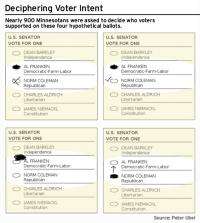Study finds voters blind to their own biases

(PhysOrg.com) -- When people are asked to judge poorly filled-out ballots in an attempt to determine voter intent, their vision becomes unconsciously clouded by partisan bias.
Some times every vote really does count. In November 2008 in Minnesota, for example, the U.S. Senate race between incumbent Republican Norm Coleman and Democratic challenger Al Franken was so close that the state was forced to determine voter intent on thousands of ballots that had been filled out incorrectly.
But can you accurately determine voter intent? A soon-to-be published study has found that when people judge poorly filled-out ballots in an attempt to determine voter intent, their vision becomes unconsciously clouded by partisan bias. This finding highlights the difficulty that election officials -- the people in charge of judging ballots -- have in viewing such ballots objectively.
Peter Ubel, a professor of marketing and public policy at Duke University and lead author of the study, said people of all political stripes are blind to their own biases. This, he says, helps explain why we live in an increasingly polarized political environment, and why it is so difficult to agree on who has won close elections.
In the study, Ubel and University of Michigan professor Brian J. Zikmund-Fisher presented hypothetical ambiguous ballots to 899 Minnesota residents and asked them to judge voter intent before indicating who they had actually voted for in the 2008 U.S. Senate election. In all four ballots, respondents who voted for Coleman were significantly less likely to award an ambiguous vote to Franken. The exact same pattern was observed in reverse for Franken supporters.
"This finding raises fundamental questions about the ability of people to evaluate ambiguous ballots in a neutral manner, and goes a long way toward explaining why it is so difficult to resolve close elections in ways that satisfy all participants," notes the paper, which is to be published in January in the journal PS: Political Science and Politics.
"The election in Minnesota was essentially a tie, with the ultimate outcome depending on many decisions about which votes to count, and who to award those votes to. Our study demonstrates that many of these decisions are susceptible to unconscious partisan bias. Ballot design, and the methods of awarding disputed ballots, should be revised to account for such unavoidable biases.
"Fortunately, it is possible to design ballots in a way that overcomes these biases," the authors write. "Ballot design, and the methods of awarding disputed ballots, should be revised to account for such unavoidable biases."
Provided by Duke University















